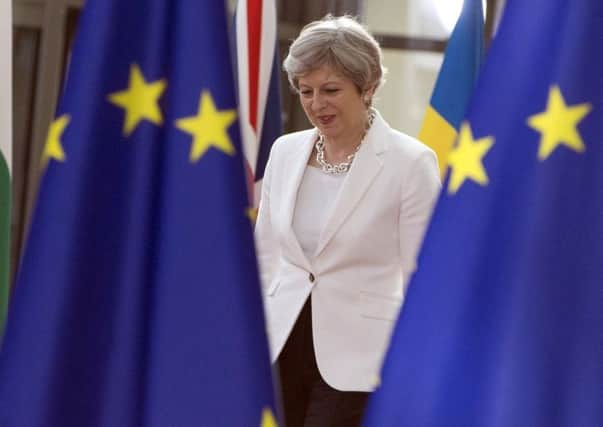Downing Street optimistic Brexit talks will turn to trade as food industry warns of rising prices


Echoing David Davis’ calls for Brussels to show greater flexibility in its approach to Brexit discussions, the Prime Minister has repeated assertions that Britain is “in a good position” and ready to “move on” to negotiating its future trade and security arrangements with Europe.
Her comments follow the latest intervention from Commission President Jean Claude Juncker, who yesterday dismissed the UK’s efforts to set out its Brexit plans as unsatisfactory and warned there are still an “enormous amount” of issues to settle before talks can progress
Advertisement
Hide AdAdvertisement
Hide AdThey also came as Mrs May prepared to travel to Japan in a bid to boost post-Brexit trade links with the East Asian country.
EU and UK negotiating teams are currently engaged in the third round of formal talks in Brussels as the two parties thrash out the details of a withdrawal agreement. Key issues to be settled include the future rights of EU citizens living in the UK, how to avoid a return to a hard border between Northern Ireland and the Republic, and the so-called divorce bill.
The previous round of talks concluded with a critical response from the Commission, as chief negotiator Michel Barnier accused his British counterparts of lacking clarity. Mr Barnier offered further criticism on Monday, using a joint press conference with Mr Davis to urge his British counterparts to take negotiations more “seriously”.
The atmosphere of hostility was stoked by Mr Juncker as he responded to the recent slew of UK position papers by suggesting that “none” of the documents published over the last fortnight “is actually satisfactory”.
Advertisement
Hide AdAdvertisement
Hide Ad“There is still an enormous amount of issues which remain to be settled. Not just on the border problems regarding Ireland and Northern Ireland, which is a very serious problem in respect of which we have had no definitive response, but we also have the status of European citizens living in the UK and UK citizens living on the continent,” he said.
“We need to be crystal clear that we will commence no negotiations on the new relationship –particularly a new economic and trade relationship – between the UK and the EU before all these questions are resolved.”
His criticism coincided with an article by the former Foreign Secretary Lord Hague, who yesterday argued that European leaders risk “[going] round in circles” if they insist on restricting talks to withdrawal.
But responding to Mr Juncker’s comments, the Prime Minister’s spokesman said: “We believe we are in a good position and would like to move on to discuss our future relationship.
Advertisement
Hide AdAdvertisement
Hide Ad“As David Davis said, we believe we need the EU to show some more imagination and flexibility when it comes to these discussions.”
Formal talks are due to continue in Brussels until Thursday.
The British Retail Consortium (BRC) will warn today that food prices could rise unless measures to tackle red tape and improve ports are put in place before Brexit.
In a report setting out its goals for the future customs relationship, the organisation said delays, disruption or additional costs would “affect availability on the shelves, increase waste and push prices up”.
Advertisement
Hide AdAdvertisement
Hide AdMore than three-quarters of food imported by the UK comes from European Union countries. The BRC warned that a “no deal” scenario, with the UK leaving the EU without an agreement on a future trading relationship, could result in major delays in getting perishable products such as food across borders.